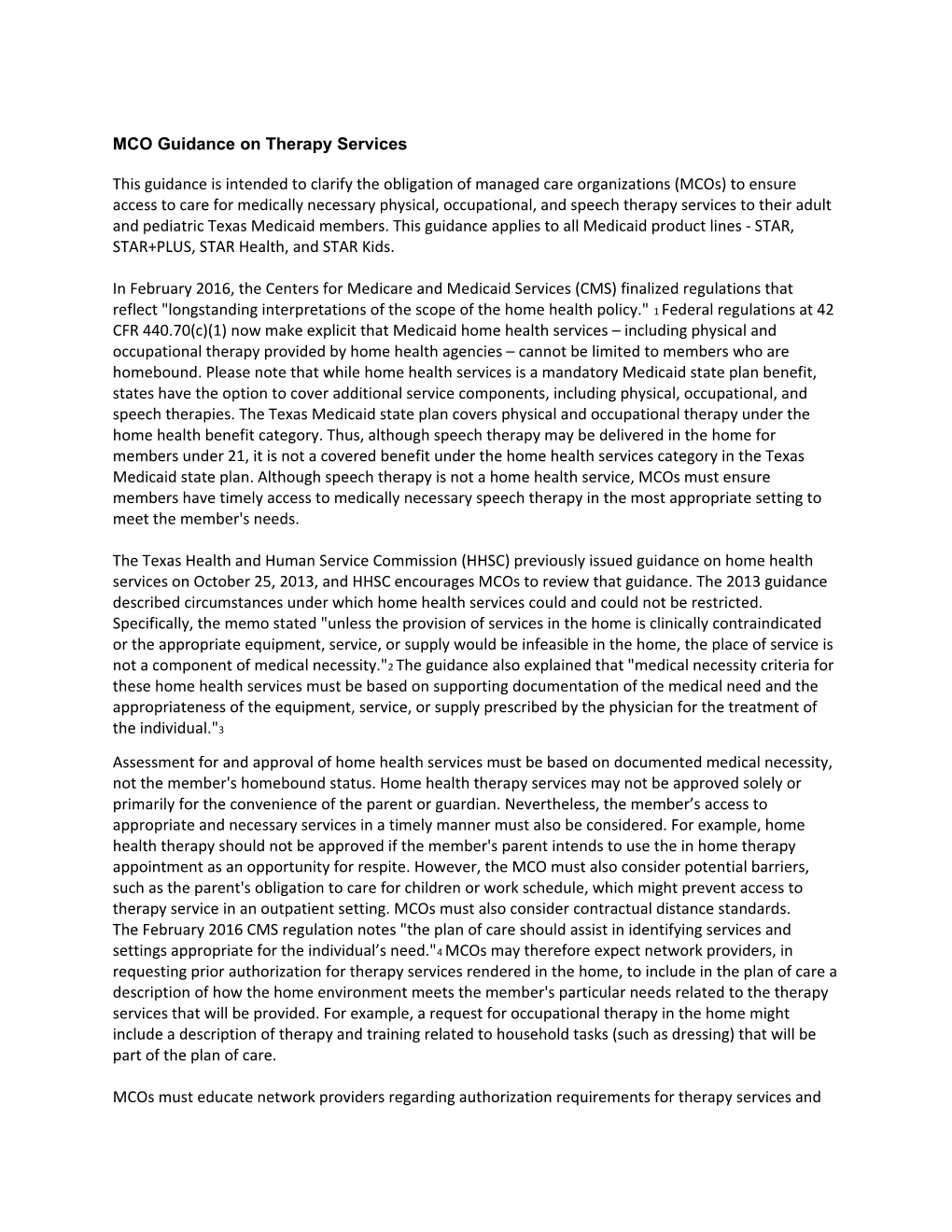MCO Guidance on Therapy Services
This guidance is intended to clarify the obligation of managed care organizations (MCOs) to ensure
access to care for medically necessary physical, occupational, and speech therapy services to their adult
and pediatric Texas Medicaid members. This guidance applies to all Medicaid product lines ‐ STAR,
STAR+PLUS, STAR Health, and STAR Kids.
In February 2016, the Centers for Medicare and Medicaid Services (CMS) finalized regulations that
reflect "longstanding interpretations of the scope of the home health policy." 1 Federal regulations at 42
CFR 440.70(c)(1) now make explicit that Medicaid home health services – including physical and
occupational therapy provided by home health agencies – cannot be limited to members who are
homebound. Please note that while home health services is a mandatory Medicaid state plan benefit,
states have the option to cover additional service components, including physical, occupational, and
speech therapies. The Texas Medicaid state plan covers physical and occupational therapy under the
home health benefit category. Thus, although speech therapy may be delivered in the home for
members under 21, it is not a covered benefit under the home health services category in the Texas
Medicaid state plan. Although speech therapy is not a home health service, MCOs must ensure
members have timely access to medically necessary speech therapy in the most appropriate setting to
meet the member's needs.
The Texas Health and Human Service Commission (HHSC) previously issued guidance on home health
services on October 25, 2013, and HHSC encourages MCOs to review that guidance. The 2013 guidance
described circumstances under which home health services could and could not be restricted.
Specifically, the memo stated "unless the provision of services in the home is clinically contraindicated
or the appropriate equipment, service, or supply would be infeasible in the home, the place of service is
not a component of medical necessity."2 The guidance also explained that "medical necessity criteria for
these home health services must be based on supporting documentation of the medical need and the
appropriateness of the equipment, service, or supply prescribed by the physician for the treatment of
the individual."3
Assessment for and approval of home health services must be based on documented medical necessity,
not the member's homebound status. Home health therapy services may not be approved solely or
primarily for the convenience of the parent or guardian. Nevertheless, the member’s access to
appropriate and necessary services in a timely manner must also be considered. For example, home
health therapy should not be approved if the member's parent intends to use the in home therapy
appointment as an opportunity for respite. However, the MCO must also consider potential barriers,
such as the parent's obligation to care for children or work schedule, which might prevent access to
therapy service in an outpatient setting. MCOs must also consider contractual distance standards.
The February 2016 CMS regulation notes "the plan of care should assist in identifying services and
settings appropriate for the individual’s need."4 MCOs may therefore expect network providers, in
requesting prior authorization for therapy services rendered in the home, to include in the plan of care a
description of how the home environment meets the member's particular needs related to the therapy
services that will be provided. For example, a request for occupational therapy in the home might
include a description of therapy and training related to household tasks (such as dressing) that will be
part of the plan of care.
MCOs must educate network providers regarding authorization requirements for therapy services and
must, if and when the MCO issues a denial, explain clearly the reason for the denial and what, if any,
additional documentation the provider needs to submit to support the request. MCOs are encouraged
to work proactively with providers prior to denying a request for service to request additional
documentation that might be needed. MCOs should make expectations for authorization clear in policy
and training materials. HHSC encourages MCOs to consider the burden on and input from providers
when developing authorization processes for therapies, as for all other services.
MCOs must also ensure adequate access to network providers of therapy services according to
standards specified in the contract. For example, if a member is determined to need medically
necessary therapy and is approved for therapy in a clinic setting, the MCO must ensure timely access to
an outpatient therapy provider, as well as availability of all services documented in the service plan.
1 81 Federal Register (FR) 5529.
2 Health and Human Services Commission, Policy Memo 2013‐03, 2013.
3 Ibid.
4 81 FR 5544.
2/15/2017
